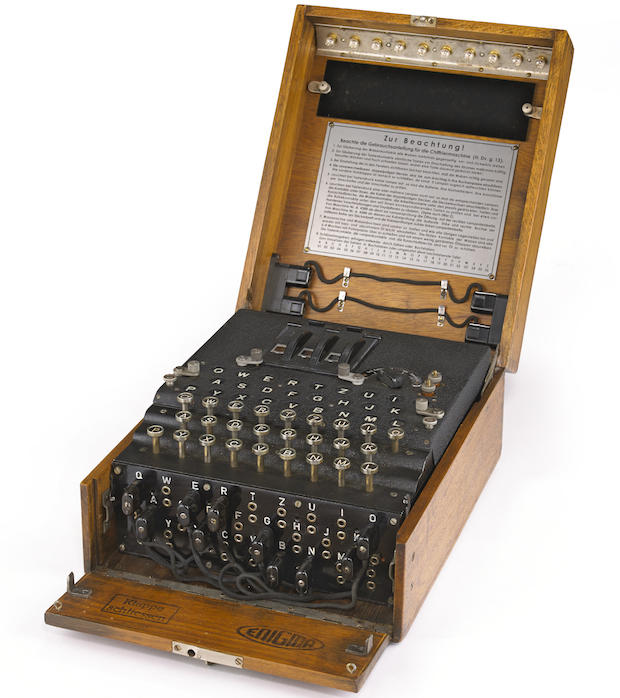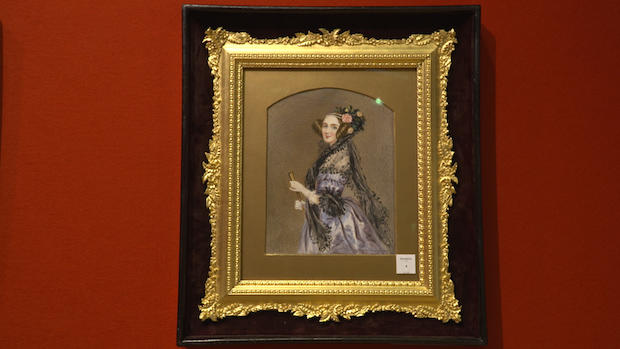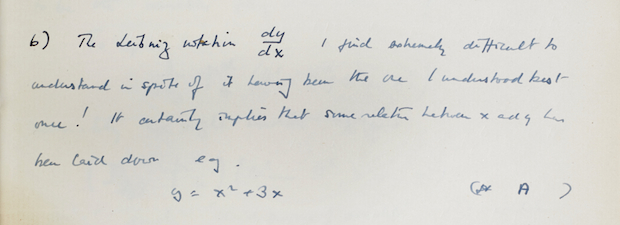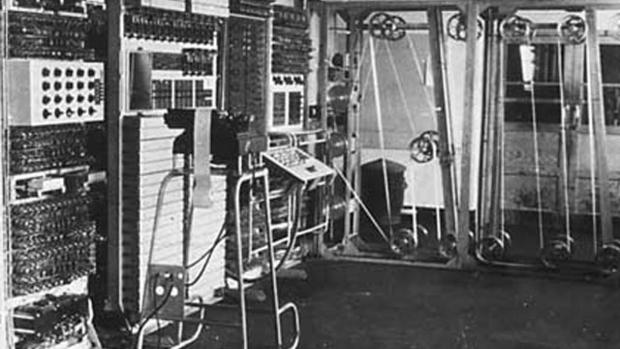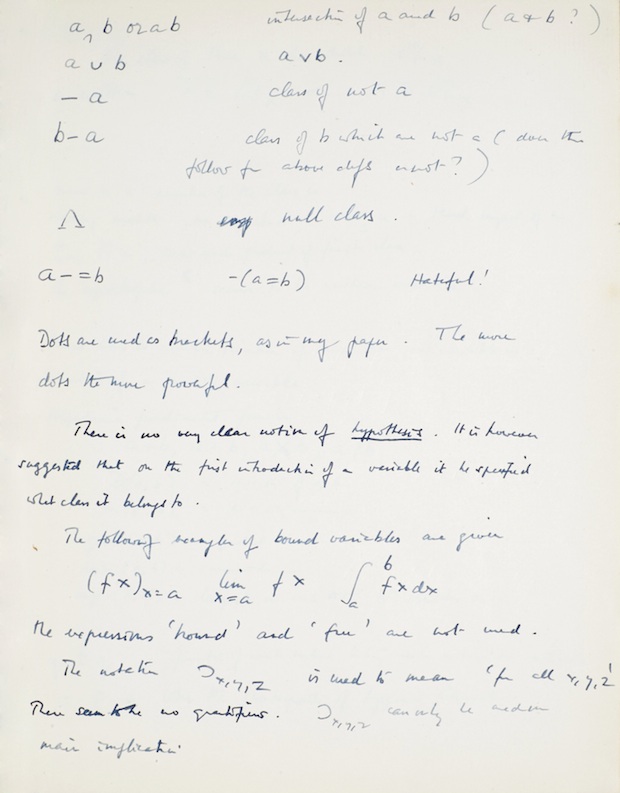Rare Alan Turing manuscript, Enigma machine up for auction
"The Imitation Game" helped make World War II code breaker Alan Turing a household name.
But for all the attention he has gotten for breaking Nazi Germany's Enigma code, the British mathematician still remains a bit of mystery. He left behind no diaries after he committed suicide in 1954 and few documents offering insight into his scientific thinking.
That is why a recently discovered manuscript from the man known as the father of computer science is garnering so much attention. Filled with formulas and scientific musings jotted down between 1942 and 1944, it is believed to be only one in existence and will be auctioned off Monday by Bonhams in New York.
Never before seen by the public, it could fetch a price in the seven figures, making it possibly the most valuable manuscript sold by Bonhams.
"Alan Turing was parsimonious with his words and everything from his pen has special value," Andrew Hodges, a Turing scholar whose book "Alan Turing: The Enigma" was the basis for the movie, said. "This notebook shines extra light on how, even when he was enmeshed in great world events, he remained committed to free-thinking work in pure mathematics."
Cassandra Hatton, director of history of science and technology at Bonhams, spent the better part of the year studying the manuscript. There are no dark secrets in his writing, she said, but signs of a man starting to formulate the "foundation of mathematics and computer science."
"Its mathematical content gives an extraordinary insight into the working mind of one of the greatest luminaries of the 20th century," she said. "This is quite simply one of the most extraordinary pieces I have ever had the privilege to handle."
Alongside the 56-page notebook, Bonhams will be auctioning off several other computer-related items including a working Enigma machine that produced the code Turing eventually broke. It is expected to bring bids of $140,000 to $180,000.
Looking a little like an old typewriter, the machine used by the Germans scrambled plain-text messages to produce a cipher text message, a virtually unbreakable code. The code, which was reset every day, could be deciphered using a codebook as long as the person had the day's settings.
Turing invented a massive machine known as the bombe - which no longer exists - with rotating drums that mathematically eliminated potential codes. Cracking the cipher allowed British intelligence to decode messages to German U-boats that had preyed on Allied shipping, helping to shorten the war by an estimated two years and saving millions of lives.
"In terms of the history of the Enigma machines, they were really the key to Nazi success," Hatton said. "If Alan Turing and the other code breakers at Bletchley Park had not finally figured out how to break that Enigma Code, the war would have gone very differently."
A portrait of Ada Lovelace, the daughter of romantic poet Lord Byron and considered the first computer programmer, will also be auctioned. There will also be a letter written by Lovelace on the block, in which she mentions Charles Babbage. She corresponded with Babbage and wrote the algorithms that he needed to make his mechanical computer function.
"In terms of computing history, the first coder with one of the first computer inventors being mentioned together in a letter is something quite exciting to have," Hatton said.
Much of the attention Monday, though, will be on the manuscript, which at first glance seems like an ordinary notebook, easily overlooked in an auction that also features a first edition of "Moby Dick" owned by Jim Morrison and a King James Bible from 1611.
But paging through the document offers a rare window into Turing's thinking as he worked on breaking the code at Bletchley Park. Turing spent much of the time analyzing the work of his predecessors including Guiseppe Peano from Italy and Gottfried Wilhelm von Leibniz, a German polymath who was among one of the great thinkers of the 17th and 18th century and who, along with Isaac Newton, discovered calculus.
"The Leibniz notation I find extremely difficult to understand in spite of it having been the one I understood the best once!" he wrote.
Turing's goal, Hatton said, was creating a universal language for computers.
"Mind you, four years prior at the age of just 24 he had invented the universal computing machine," she said. "So, a logical next step was to think of a universal language for that machine."
It also shows what was lost, since many of these formulas were never published.
"It shows us all of these ideas that Turing never got to develop in his life, which is really sad," Hatton said. "Who knows what he could have accomplished in his life?"
While much of the writing was strictly math, there are signs of his emotions coming through. At one point, he used the words "hateful" and "inconvenient" when comparing two mathematical formulations.
"You can picture him sitting at a desk and being angry at these people who were not being precise enough in their writing, in how they use their notations," Hutton said.
The notations never cross into the realm of his personal life, however, which took a series of tragic turns after his code breaking success.
He was later found guilty of crimes of gross indecency for engaging in homosexual acts and is now seen as a gay icon. He was posthumously pardoned by the British government.
The manuscript does shed light on the relationship between Turing and one of his best friends, a student named Robin Gandy. After Turing committed suicide due to the hormone treatment he was forced to endure as a supposed cure for his homosexuality, Gandy inherited many of his scientific papers - many of which were near ready to be published - and the manuscript.
Gandy handed over the papers to the Archive Center at King's College in 1977, but he held onto the manuscript. The motivation, it seems, was that Gandy had begun to fill the manuscript's empty pages with his own personal thoughts, including comments blaming Turing's therapist for his suicide.
In his notes, Gandy, who was also gay and took up Turing's work after his death, laid bare revelations of a profound relationship with his teacher: "It seems a suitable disguise to write in between these notes of Alan's on notation, but possibly a little sinister; a dead father figure, some of whose thoughts I most completely inherited."
After Gandy's death in 1995, the manuscript was stored away with piles of papers. It was discovered a few years ago and will go to a buyer who may or may not see the merits of sharing it with a wider audience.
Hatton said she has tried to impress upon any potential buyers the "importance of sharing this with the scholarly community, being shared with the public" because it hasn't been studied.
Harking to the way Bill Gates made the Leonardo da Vinci's Codex Leicester available to the public after buying it, Hatton said she expects something similar will be done with the Turing manuscript.
"The type of person who is going to spend this kind of money on something by Alan Turing will be someone who understands that, will be someone who will want it to be studied," she said.
And that person is unlikely to be a recent convert who has learned about Turing from the movie, which won the Academy Award for best picture earlier this year.
"I can't image a scenario where somebody is sitting in a theater and goes, 'Gee, I'm going to spend millions of dollars on this manuscript because this movie was great,'" she said. "It will probably be someone who has been an admirer of Turing for a long time."
